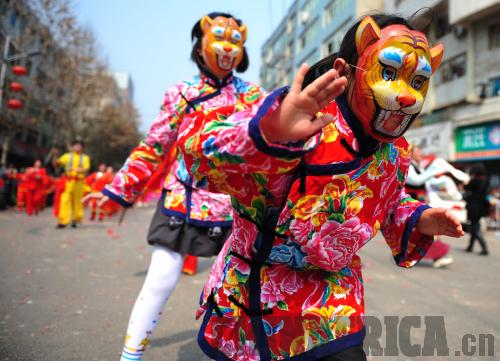| 
Recently, Chinese writer Mo Yan was awarded with the 2012 Nobel Prize for literature. Mo's most well-known novel Red Sorghum was turned into a film by the famous Chinese director Zhang Yimou. Several years later, Zhang directed another film titled Riding Alone for Thousands of Miles, which introduces Nuo Opera, an ancient Chinese form of opera, to the audience. The film tells a story of an aging Japanese father traveling to China's Yunnan Province to film Riding Alone for Thousands of Miles, a traditional work in the local Nuo Opera, for his son who suffers from liver cancer. The audience is not only moved by the affection between the father and the son, but also captured by the mysterious Nuo Opera culture, as well as the awe-inspiring Nuo masks.
"Nuo," also called the "Nuo sacrifice" or "Nuo ceremony," was originally a type of sacrificial and magical ritual held to expel evil spirits and pestilence. Its name is derived from one of such rituals, where people shouted "nuo, nuo" to drive away the devil. The Nuo Dance was originally performed to drive away evil spirits at sacrificial rituals during ancient times. Afterward, to attract more people to attend the ritual, shamans integrated traditional Chinese folk songs, dances and musical instruments in the ritual. The Nuo Dance gradually developed into a dance opera, and became more of a recreation than a ritual. With its long history, Nuo Opera has been deemed by experts and scholars as "the living fossil of Chinese opera."
However, for many reasons, Nuo sacrifice was totally banned across the country in the early 1950s, and Nuo Dance, as an artistic form, has gradually declined. But the dance survived in the remote, mountainous and secluded southwestern region, which has little interaction with the outside world, and is mostly inhabited by ethnic minority groups. Many places where Nuo culture once flourished now take it as an important tourist and cultural resource, which attracts people to explore the magical Nuo culture.
The most distinctive feature of Nuo Opera is that the performers wear masks. A saying in the Tujia and the Miao ethnic groups in Guizhou Province goes, "one becomes a god when putting on the mask, and back to human when taking it off." The mask here refers to the Nuo mask. Like many African masks, Nuo masks come in different shapes. Yet these masks are endowed with mysterious religious and customary meanings, both in Nuo sacrificial and Nuo Opera performances. People in Nuo culture circles, who regard the masks as the symbols and carriers of gods, observe various rules and conventions. For instance, according to rules, women are not allowed to touch or wear the masks, and only men can produce, use and store masks. Once a man wears a mask, he is supposed to be possessed by a god or spirit. Therefore, he must not speak or act freely.
Although Nuo masks are endowed with mysterious religious and customary meanings, they are art treasures themselves. Different roles require different masks to reveal the characters through their changing facial features and decorations. The masks are highly aesthetic. The materials, colors and applications of Nuo Opera masks vary across the regions, ethnic groups, cultural and aesthetic interests. That distinctiveness adds to the masks' enchanting beauty.
In recent years, scholars from both China and abroad have become interested in Nuo culture again. As early as in 2006, more than 20 kinds of Nuo Operas, dances and folk customs were listed in the first batch of national intangible cultural heritage by the Chinese Ministry of Culture. On August 15, 2012, an exhibition entitled "Soul and Verve of Nuo Opera: Art Exhibition on Nuo Opera and Nuo Mask" was held at China's National Grand Theater. This marks the largest exhibition on Nuo Opera since the founding of the nation. In recent years, China has also held international Nuo culture festivals, in which over 20 Nuo Opera troupes from over 10 countries were invited to perform.
However, there is no denying that due to historical and practical reasons, Nuo culture has gradually declined. Yet, as an art form, Nuo Opera still survives even today, spreading in rural villages across the country. This is because it has been deeply rooted in the aspirations of the Chinese people, and expresses their reflections on life, death and nature. |